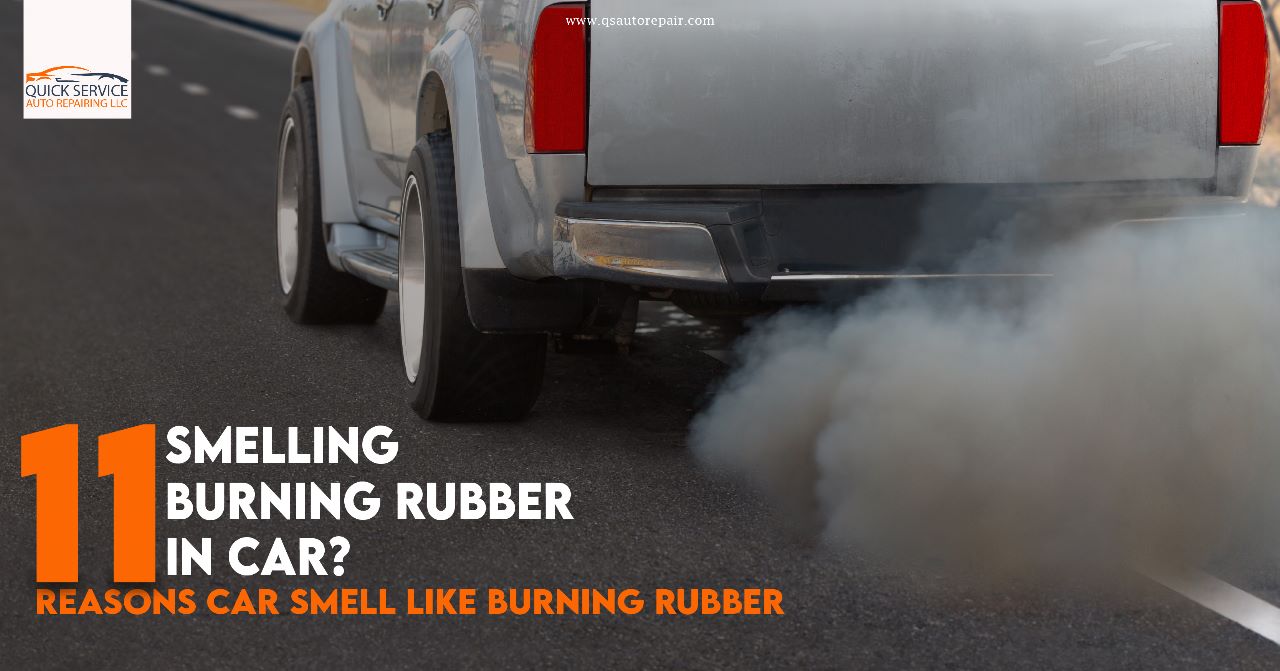We Are Open 7 Days a Week
Fri to Thu 08:00 AM - 10:00 PM
Why Does My Car Smell Like Rotten Eggs

Nobody likes a smelly car, but sometimes things happen that lead to unpleasant odors. If your car smells like rotten eggs, it can be concerning and embarrassing when you drive around town. The good news is, identifying the cause and fixing the problem isn’t too tricky.
The smell can be very strong and might even make you nauseous. Diagnostics are necessary to identify the exact cause of a rotten egg smell in your car. This article will explain “Why Does My Car Smell Like Rotten Eggs” and how to diagnose and fix the problem.
A. Faulty Exhaust System
A faulty exhaust system can be one of the primary reasons why your car smells like rotten eggs. An exhaust system malfunction or failure can cause a combination of burning gasoline and sulfur to produce an unpleasant smell reminiscent of rotten eggs. The most common culprits are a broken catalytic converter, manifold gasket leaks, and exhaust pipe cracks. If any of these issues are present, it could result in an excessive accumulation of unburned fuel entering the exhaust stream, creating a smoky odor and sometimes even visible smoke from your car.
It’s important to note that other symptoms, including reduced engine performance, increased fuel consumption, and engine misfiring, often accompany this issue.
B. Malfunctioning or Broken Catalytic Converter
A malfunctioning catalytic converter is an expected possible reason your car smells like rotten eggs. The catalytic converter helps reduce toxic exhaust gases from your car’s engine, but when it fails to work correctly, these toxic fumes can leak into the cabin and create an unpleasant smell. Not only does this cause a foul odor, but it can also be dangerous to you and those nearby your vehicle.
The most common signs of a failing catalytic converter are decreased fuel efficiency, increased emissions levels, and excessive heat near the exhaust pipe. If you suspect your car’s smell is due to a faulty catalytic converter, it is advisable to get your car checked out by an experienced mechanic as soon as possible. They will be able to diagnose the issue accurately and advise you on the best course of action for repair or replacement with a new catalytic converter.
C. Leaking Gasoline or Oil: Worn Out fuel filter
Leaks from gasoline or oil can produce a rotten egg smell in your car, and it’s essential to identify the source of the leak and take action as soon as possible. If you have noticed this smell in your vehicle, you may need to inspect for leaks in areas such as the fuel line, fuel filter, injectors, valves, gaskets, and seals. It is also necessary to check if any oil leaks come from around the engine.
In some cases, a cracked exhaust manifold may be responsible for producing this odor in your car. Additionally, old gas sitting in the tank can cause a buildup of sulfur compounds that give off a rotten egg smell when burned by the engine. It is crucial to address these issues immediately since leaking gasoline or oil can be hazardous inside and outside your vehicle while driving.
D. Old Transmission Fluid
Old transmission fluid is a common problem for car owners everywhere. If your car starts to smell like rotten eggs, the first thing you should check is the transmission fluid. If it’s old or hasn’t been changed in a while, that could be the source of your smelly issue. Transmission fluid breaks down over time and can emit an unpleasant odor resembling rotten eggs.
This is not only an unpleasant experience but can also have severe consequences for your vehicle’s performance if left unchecked. The best way to prevent this is by regularly checking and changing your transmission fluid as the manufacturer’s service schedule recommends. Doing so will help keep your car running smoothly and free from any noxious smells!
E. Faulty Fuel Pressure Sensor
A faulty fuel pressure sensor can cause your car to smell like rotten eggs. A fuel pressure sensor monitors the amount of fuel pressure in a vehicle’s engine, and when it malfunctions, it can lead to an increase in unburned hydrocarbons.
These gases contain sulfur compounds released into the exhaust system, giving off a strong odor like rotten eggs. If your car has been smelling like this lately, you may need to have your vehicle inspected by a professional mechanic to determine if the fuel pressure sensor is at fault.
The symptoms of a failing fuel pressure sensor include difficulty starting the engine and inconsistent acceleration while driving due to incorrect air/fuel ratios being delivered to the combustion chamber. Also, improper injection timing can result in poor gas mileage and increased emissions from your tailpipe.
F. Dead animal
A rotting corpse in or near your car can cause it to emit the same rotten egg odor that many other issues do. While this may sound like a worst-case scenario, it is familiar and easy to diagnose and fix.
If you think you’ve got a dead animal near or under your vehicle, it’s essential to act quickly before the smell becomes unbearable. The first step is to inspect for any visible signs of a carcass; check along the car’s sides and underneath for anything that looks out of place.
G. A Rotten Egg or Forgotten groceries
A rotten egg smell in the car can be caused by various reasons, some of which may have nothing to do with automotive issues. While it is not every day, grocery items that are accidentally dropped or left behind can cause a stale and foul odor throughout the vehicle. If you wonder why your car smells like rotten eggs, it might be due to something unexpected and straightforward.
The first step in addressing this issue should always begin with seeking out any visible food sources such as loose wrappers or spilled yogurt containers- these could be signs pointing towards a culprit for your smelly car. It is possible that when you got groceries from the store, one may have fallen out of a bag without you noticing and ended up somewhere within your vehicle’s interior. This can lead to bacteria growth within those areas causing an unpleasant smell over time.
Troubleshooting and Diagnosis to get rid of the rotten Egg Smell in your car
A. Checking for Leaks and Damage to the Exhaust System
Checking for Leaks and Damage to the Exhaust System is essential in determining why your car smells like rotten eggs. An exhaust leak or damage can be a potential cause of this unpleasant odor and is one of the first places to check when trying to diagnose the problem. To identify if there are any leaks, you’ll need to inspect the entire length of your car’s exhaust system.
Look for any missing clamps, bolts, or other parts that have become detached from the system over time. Additionally, check all joints and hangers for cracks or signs of wear that could potentially lead to an exhaust leak. If you find any issues with your exhaust system, it’s best to get them repaired as soon as possible before any further damage is done.
B. Inspecting the Catalytic Converter for Damage or Blockage
The foul odor of rotten eggs emanating from your car can be a symptom of several issues, including a damaged or blocked catalytic converter. The catalytic converter is an integral part of the exhaust system and helps reduce harmful environmental emissions. However, when it’s not working properly, you may notice that your car has become louder and emitting an unpleasant odor. To determine if your catalytic converter is the source of the smell, here’s how to inspect it for damage or blockage.
You’ll need to access the catalytic converter by locating it in your vehicle’s exhaust system. Depending on where the issue is located, this could require some disassembly of parts such as mufflers or exhaust pipes.
C. Testing the Fuel System for Contamination
Testing the fuel system for contamination is essential in diagnosing why your car smells like rotten eggs. Contaminated fuel can cause a wide range of issues that affect engine performance, from reduced power and acceleration to increased emissions. It is essential to be aware of this potential problem to diagnose and fix it before further damage occurs quickly.
The first step in testing for fuel contamination is detecting any unusual odors from the exhaust pipe. If there is a strong smell of sulfur or rotten eggs, there could be contamination in the fuel system. You must inspect your engine’s intake manifold and exhaust pipe to test this. When looking at both parts, if you see any particles or debris present, there could be contaminants in the fuel system causing the foul odor.
D. Check your car thoroughly.
The smell of rotten eggs from your car can be alarming, and it is essential to check your vehicle thoroughly. The smell could indicate a problem with your car and signal an underlying safety issue that needs to be addressed.
Inspecting for any fluids leaking from the engine or exhaust pipe should be one of the first things you do when diagnosing why your car smell like rotten eggs. If there are any leaks present, they need to be identified and taken care of right away. Other possible causes include a malfunctioning catalytic converter or an oil leak in the engine.
If you cannot pinpoint where the smell is coming from, have a professional inspect your car as soon as possible so they can diagnose and repair any potential issues before they become more severe and expensive to fix.
Prevention Strategies of Car Smell Like Rotten Eggs
A. Regular Maintenance Checks on Your Car’s Exhaust System and Catalytic Converter
For car owners, regular maintenance checks are essential to ensure the longevity and performance of your vehicle. Keeping your car’s exhaust system in check is vital, and you should regularly inspect the pipes and catalytic converter for any signs of damage or wear. The catalytic converter plays a vital role in reducing the air pollution your car produces, so it’s essential to keep it functioning correctly. A failing catalytic converter can cause a strong smell similar to rotten eggs, so it’s essential to address the issue immediately if there are any signs of trouble.
Checking the exhaust system is relatively simple; look out for corroded components, rust spots on the piping, or excessive smoke from the assembly. If you spot these signs or experience any unpleasant odors while driving, take your car to a licensed Auto Repair Garage immediately which can investigate further.
B. Using High-Quality Fuel to Minimize Sulfur Buildup in the Fuel Tank
High-quality fuel is one of the best ways to minimize sulfur buildup in your vehicle’s fuel tank. Sulfur buildup can cause your car to smell like rotten eggs and, if left untreated, can damage components of the engine and exhaust system. To improve the performance of your car and reduce unpleasant odors, it’s essential to understand why sulfur buildup occurs and how you can prevent it from happening.
The most common reason for sulfur buildup is using low-grade or contaminated fuel sitting for an extended period. This fuel contains higher levels of sulfur which causes a reaction with oxygen when burned in the combustion chamber. This reaction creates a byproduct known as sulfur dioxide, which gives off an unpleasant odor similar to rotten eggs.
Conclusion: Why Does My Car Smell Like Rotten Eggs
In conclusion, staying on top of your car’s odors is essential. If you notice a smell like rotten eggs emanating from your vehicle, it could indicate a more serious issue. It is always best to take your car to the mechanic for a thorough inspection if you are unsure what could be causing this type of odor.
The most common causes for a car to smell like rotten eggs are problems with the catalytic converter or exhaust system and potential electric motor and battery issues. Other reasons include sulfur-based fuel additives or leaking coolant from the radiator, which can produce an unpleasant odor in your car. Lastly, dirty air filters and clogged ventilation systems can also lead to undesirable smells within your vehicle’s interior.









